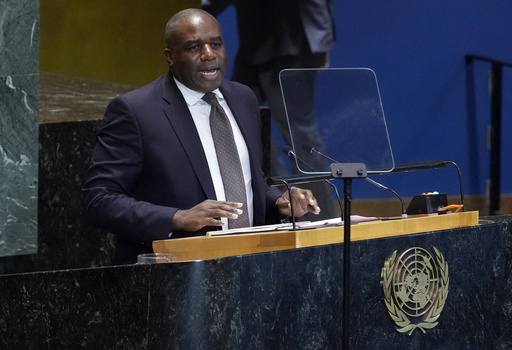
LONDON — This week, British Foreign Secretary David Lammy is embarking on his inaugural official visit to China in a bid to rejuvenate the United Kingdom’s relationship with Beijing, focusing on “pragmatic engagement” despite ongoing issues related to human rights and other critical concerns.
Relations between the U.K. and China have notably soured in recent years due to various allegations of espionage and cyber attacks, the crackdown on civil liberties in Hong Kong—previously a British territory—and China’s alliance with Russia amidst the ongoing conflict in Ukraine.
During this two-day visit, which begins on Friday, Lammy is scheduled to tour Beijing and Shanghai, as confirmed by U.K. officials.
According to spokesperson Dave Pares of Prime Minister Keir Starmer, while Britain aims to foster cooperation with China, it is also prepared to confront Beijing regarding contentious issues, including the imprisonment of Jimmy Lai, a prominent Hong Kong activist and former publisher of the defunct Apple Daily newspaper, who has been detained since 2020.
Pares emphasized that securing Lai’s release remains a significant concern for the British government. Lai, who holds British citizenship, has seen his legal representation urging the U.K. authorities to amplify efforts for his release.
“We urge the Hong Kong authorities to halt their politically charged prosecutions and liberate Jimmy Lai immediately,” he stated. He added that Lammy had raised this issue in his dialogue with Chinese Foreign Minister Wang Yi during a meeting at a Southeast Asian summit in Laos in July, and intends to continue advocating for it.
“The U.K.’s objective is to maintain practical engagement with China, which is beneficial for both the U.K. and the global landscape,” he remarked.
Since assuming leadership of the Labour Party following a decisive electoral win in July, Starmer has yet to outline a distinct strategy concerning the U.K.’s relationship with China. His predecessor, Rishi Sunak, faced substantial pressure from Conservative members to adopt a firmer position on China, particularly concerning security and human rights. Nonetheless, Sunak preferred a more diplomatic approach, underscoring the importance of staying engaged with China, even as it presents a growing “systemic challenge” to British values and interests.
James Cleverly was the last British foreign secretary to visit China, making the trip in 2023 to stress the significance of continuous communication with Beijing despite existing differences.
Earlier in March, British and U.S. officials disclosed that hackers linked to the Chinese government were involved in a large-scale, state-sponsored operation targeting numerous officials, journalists, corporations, pro-democracy advocates, and the U.K. electoral oversight body. The campaign was purportedly aimed at undermining critics of the Chinese regime and obtaining intelligence on influential political figures.
This year also saw four individuals in Britain charged with espionage linked to China, accused of assisting Hong Kong authorities in intelligence acquisition within the U.K. Among those charged were a former parliamentary researcher and the office manager of the Hong Kong trade office in London.
In response, Beijing has accused the British intelligence agency MI6 of enlisting a Chinese couple to act as spies.
On Thursday, China’s Foreign Ministry expressed that it is “ready to collaborate with the British side” to enhance cooperation and foster stable relations.
“As permanent members of the United Nations Security Council and significant global economies, the long-term and stable development of the relationship between China and the U.K. serves the shared interests of both nations and contributes to the international community’s efforts to address global challenges while promoting peace and development globally,” stated Foreign Ministry spokesperson Mao Ning.
